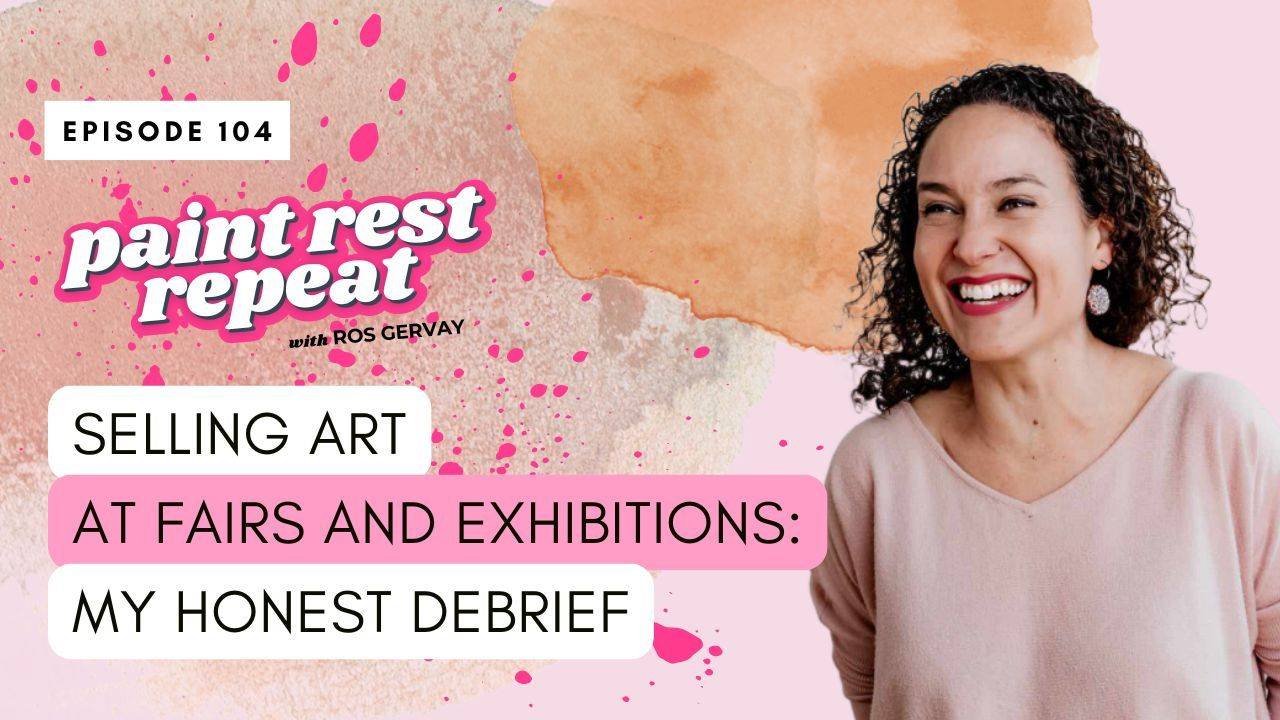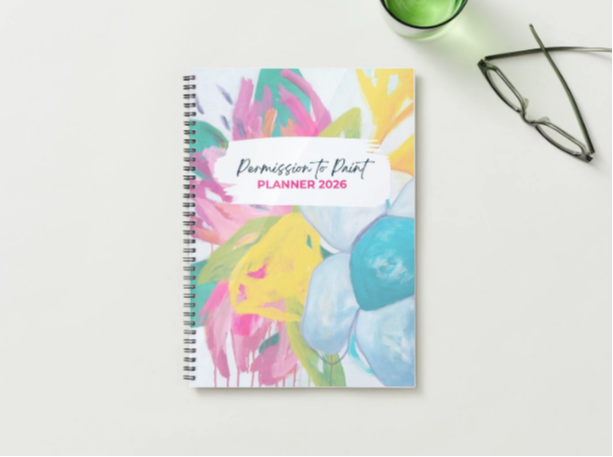Episode 104: How to Prepare for an Art Fair: Lessons from a Working Artist
18 November 2025 | Paint Rest Repeat Podcast for Artists
Updated: 16 December 2025
TL;DR: In Episode 104 of Paint Rest Repeat, artist and host Ros Gervay shares a behind-the-scenes debrief of her latest art fair experience. From sales wins and emotional wobbles to setup systems and post-event reflections, this episode is packed with practical, real-world tips. Whether you're prepping for your first art fair or looking to improve your next event, you'll walk away with tools, encouragement, and a renewed sense of possibility.
Selling Art at Fairs and Exhibitions: My Honest Debrief
If you're an emerging artist wondering how to prepare for an art fair or exhibition, you're not alone — and you're in the right place. I've just wrapped up my third major art fair, and this one pushed me in new ways. From selling small artworks and managing logistics, to riding the emotional rollercoaster of showing your work to thousands of strangers, I’m sharing the real story behind what worked, what didn’t, and what I’d change next time.
Art fairs and exhibitions are big milestones in an artist’s career. They’re exciting, nerve-wracking, and packed with learning opportunities. In this post, you'll get real-world art fair tips to help you feel more confident, more prepared, and more connected to your goals — whether it's your first event or your fifth.
Let's dive in!

Here for the links referenced in the episode?
Thrive - the mastermind for artists ready to level up. Applications are open now: permissiontopaint.co/thrive
The Permission to Paint 2026 Planner — Your creative companion for planning a joyful and productive year. Get yours here!
Episode 104: Listen using the player below, or click on your favourite listening platform to subscribe and listen there:
What Went Well: The Art Fair Wins
Let’s kick things off with what worked because there were some really encouraging moments from this fair that are worth sharing (and possibly stealing for your own setup!). Wins from this latest art fair included:
-
Sold out micro artworks: Small, affordable pieces (15x15 cm) were a huge hit with buyers.
-
Connection & community: Meaningful chats with fellow artists and gallerists were energising and encouraging.
-
Creative adaptability: Ros re-curated her booth four times, improving her display and learning what layout worked best.
-
Built-in accountability: The fair deadline gave Ros the urgency she needed to create a full collection, even with ADHD.
These wins highlight the blend of artistic and strategic thinking that successful events often require.
Systems That Saved the Day
When you’re deep in the hustle of an art fair, the systems you’ve set up (or haven’t!) can make or break your experience. A few things really saved my sanity this time around.
A few practical tools and habits helped keep things running smoothly:
-
Square App: Enabled quick and easy on-the-spot payments.
-
Consistent artwork sizing: Simplified packing and transport.
-
QR code signups: Gave visitors an easy way to join Ros's mailing list.
-
Booth layout mockups: Made re-hanging fast and frustration-free.
-
Pre-uploaded website listings: Ensured a backup plan and facilitated post-event sales.
-
Pre-scheduled emails: Meant less marketing stress during the event.
These simple systems are great reminders that preparation pays off—especially during busy, high-stakes weekends.
The Emotional Ride: Sales Wobbles & Mindset Tools
Day one of the fair brought zero sales. And with that came a wave of self-doubt.
Instead of pushing it down, Ros let the emotions out—something she’s learned through working with Emotion Release Technique (ERT) practitioner Zoe Boyce. This emotional honesty allowed her to regroup and reconnect with what matters most: modelling resilience and courage for her daughters.
Ros’s mindset tools included:
-
Letting the emotions flow instead of bottling them up
-
Reconnecting with her values (why she's doing this)
-
Leaning into community support and meaningful conversations
She also reminded herself: you are not your sales. And if you've been in the same boat? You aren't either.
What I’d Do Differently Next Time
Every art fair brings its own lessons. Here’s what Ros would shift for the next round:
-
Avoid corridor spaces: High foot traffic meant people couldn’t stop and engage with her work.
-
Plan breaks: One full day went by with no food — not ideal!
-
Schedule post-fair content: Pre-plan social posts for available works or commissions to keep the momentum going.
Emotionally, she'd also:
-
Set clearer, tiered goals (good, better, best)
-
Prepare for the post-fair crash by building in rest time
-
Arrange booth support to allow for breaks and downtime
Top Tips for Artists Preparing for Fairs and Exhibitions
Ros wrapped the episode with a few big takeaways. Whether you’re prepping for your first or fifth fair, these tips will serve you well:
1. Prepare your narrative
Be ready to talk about your work confidently and clearly. Share your process, backstory, and credentials in a way that builds trust and connection with visitors.
2. Don’t tie your worth to your sales
Instead of measuring success solely by revenue, track email signups, great conversations, and exposure. All of these are part of your long-term growth.
3. Treat the fair like a learning lab
Debrief after every event. Ask: What worked? What didn’t? What would I change? Stay curious, not critical.
4. Follow up
Send a thank-you email to buyers and interested leads. Share available works and invite them to stay connected.
Why Art Fairs Are Worth It (Even When They're Hard)
Fairs and exhibitions stretch you. They require courage, preparation, and emotional flexibility. But they also open doors—to collectors, connections, opportunities, and personal growth.
Ros sums it up perfectly: "Just showing up and saying, 'My art deserves to be here'—that alone is a win."
FAQs: Preparing for and Surviving an Art Fair
Q: What should I bring to an art fair?
A: Beyond your artwork, bring a payment system (like Square), business cards or postcards, email signup sheets (or QR codes), hanging tools, snacks, water, and comfy shoes.
Q: How do I stay emotionally grounded at an art fair?
A: Expect highs and lows. Let yourself feel disappointment if it comes, but don’t dwell there. Reconnect with your values and seek support from your community.
Q: What are some goals I should set for my first fair?
A: Try setting "good, better, best" goals that go beyond just sales—like email signups, conversations had, or pieces photographed well.
Q: Should I follow up after a fair?
A: Absolutely! Following up with buyers and leads is a simple way to turn short-term interest into long-term relationships.
Q: Is it normal to feel exhausted after an art fair?
A: Yes. It’s mentally, physically, and emotionally taxing. Schedule downtime afterward and give yourself space to rest.
Final Thoughts: You Don’t Have to Do This Alone
If you’re an emerging or growing artist craving structure, support, and a clear plan to sell your work without burning out, I’d love to invite you into Thrive — my mastermind for artists who are ready to take their art biz to the next level. We map out your goals, selling strategy, and support system so you can keep moving forward with confidence (and joy!). Applications are open now at permissiontopaint.co/thrive
Remember — every small, imperfect step is shaping the artist you’re becoming. And you’re doing beautifully.
If you’re ready for more personalised support in building your art business, there are plenty of ways we can work together — from self-paced courses and practical resources to memberships and masterminds. Reach out here.
That’s it for this episode. I’m so glad we could share this time together. Remember — every small step you take brings you closer to the artist you’re becoming.
Ros x





